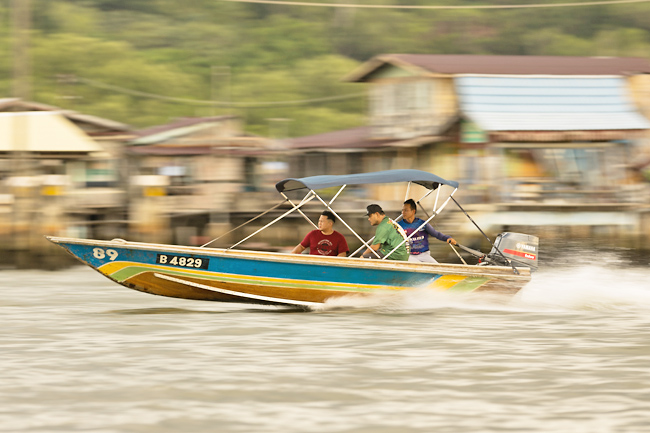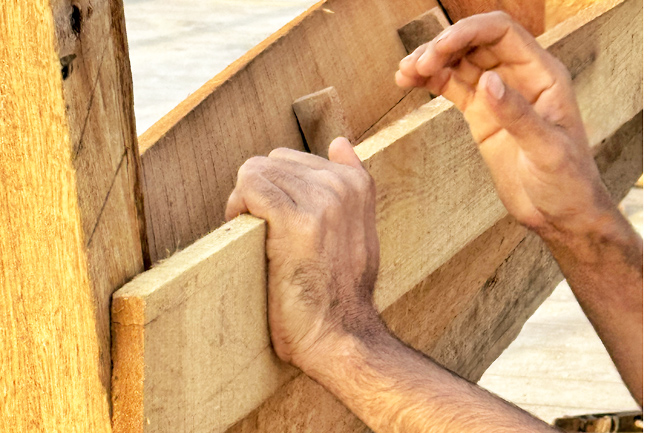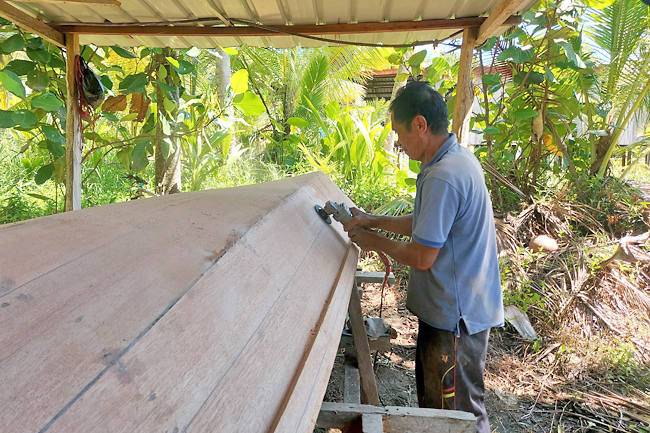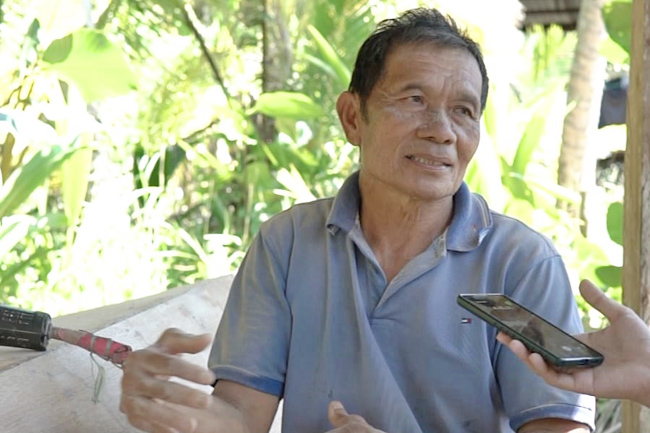There wasn’t a cloud in the sky above Berambang Island that Saturday morning as we navigated through a few bends and curves, enjoying the surprisingly cool breeze while passing what appeared to be a local orchard.
Rows of medium-height coconut trees lined the road, but soon gave way to forests and makeshift stalls on one side, with small houses on stilts along the river on the other.
We had arrived at Menunggol Laut, one of several water villages that call the island home.
At what seemed like the island’s end, a cul-de-sac opposite the Menunggol jetty, we found fisherman Bakar bin Muhamad working under a makeshift garage, planning the bottom of a traditional wooden boat.
At 65, Bakar confessed that his life had been devoted entirely to fishing, though he began building boats in his early teens.
Since mastering the craft, he estimated having built over 70 boats, though the community disagrees. To them, Bakar is a renowned boatmaker in the region, likely having lost count of how many orders he’s fulfilled over the years.
“Our grandfather made boats too, and they were the ones who taught us the skills. But the desire to learn also came from the idea that better boats could be built,” Bakar explained.
He mentioned several types of traditional boats or watercraft that were once made by older boatmakers but are no longer common today, mainly because the fishermen who used them are gone or because most fishermen now prefer fibreglass boats.




One example he cited was the jumpong, possibly crafted from a hollowed-out tree trunk split in two.
“These weren’t boats for travel or fishing, but more for transporting the day’s catch,” he noted.
When asked about the boat he’s currently building, Bakar smiled and said it’s for no one but himself.
“I’ve been making boats for a long time, but only when there were orders. I don’t get many these days, so most of the boats I’ve made recently have been for me.”
He explained that the boat he’s crafting is called a perahu bidar, though he admitted that’s a more modern name. Traditionally, it might be known as a perahu papat, referring to its smooth, straight rear, much like a hatchback.
“You only see these kinds of boats – traditionally made from wood – used by the people here in the water village and water taxis,” he noted, adding that these boats are often lighter than fibreglass ones, making them more useful for navigating the rivers during low tide.
Bakar further explained how the bow of the boat, used to ferry residents from the water village to land, often withstands impacts with the stone steps of jetties and waterfronts in the capital.
Despite these regular collisions, traditionally made boats show remarkable durability.
“But a boat like this only lasts fishermen about three years or more,” he added.
For this seasoned seafarer, it won’t be long before he builds another boat – not because of wear and tear, but simply for the love of it.
“It’s something I’ve come to enjoy,” Bakar shared, explaining that it keeps his hands busy and his mind sharp in old age.
Bakar admitted that he goes out to sea less often now, preferring to fish near the rivers and around Brunei Bay. Much like everything else, the fishing landscape has changed drastically over the years. “We’re catching less fish now. Maybe it’s because I’m old and have less energy, but it takes longer and further to find them,” he said.
“I can say that, back in the day, there was always a 100 per cent guarantee of a good catch. Sadly, that’s no longer the case,” he shared, adding that he now earns about BND500 a month, compared to the four-figure sums he used to make from fishing.
Boatmaking, then, is less about necessity and more about passion – a deeply ingrained practice that ensures the craft doesn’t disappear.
Despite having nine children and 12 grandchildren, none have taken up the mantle to learn the traditional art of boatmaking.
“At the very least, the knowledge of this craft should be preserved for its ancestral value,” the 65-year-old said. “It’s important to know the types of wood, like meranti and kapur, and even the glue that was traditionally used.”
He spoke of a type of latex derived from certain trees that traditionally needed to be cooked or boiled to use as glue or wood filler, noting how even these materials have been replaced by modern alternatives in boatmaking.
Bakar isn’t opposed to these innovations; in fact, he commends them for making his work easier as he ages. However, he emphasised the importance of preserving the knowledge of traditional methods, as a way to honour the ingenuity of our ancestors. – Wardi Wasil



















































